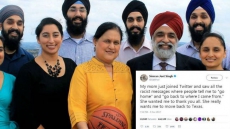“South Asian Punjabi women have lived in California since the early 1900s and making a film that documents their lives is long overdue,” claims Dr. Ranganath, whose recent and debut documentary Jutti Kasoori is the first of its kind to focus on the unsung heroes of California’s Punjabi community.
When Dr. Nicole Ranganath, filmmaker and professor at University of California (UC), Davis, decided to document the history of Punjabi women in California, her message was very simple – South Asian women’s lives matter. “South Asian Punjabi women have lived in California since the early 1900s and making a film that documents their lives is long overdue,” claims Dr. Ranganath, whose recent and debut documentary Jutti Kasoori is the first of its kind to focus on the unsung heroes of California’s Punjabi community. The 30-minute documentary, subtitled “Walking into the Unknown – A History of Punjabi Women in California”, premiered at the Sikhlens Film Festival in November, 2018, and aired on PBS KVIE Public Television right after.

In Jutti Kasoori, Punjabi women share their extraordinary life experiences over the last century in rare interviews, archival footage, and photographs. Pioneer women discuss their harrowing experiences growing up in Punjab during the 1947 partition, as well as their struggles and contributions in California’s Central Valley. The film also highlights the role of younger women as they balance achieving their professional ambitions while still maintaining their culture, faith and family duties. Dr. Ranganath explains that the title, ‘Jutti Kasoori’ refers to an old Punjabi folk song sung at weddings, that describes the young bride’s departure from her family home to her in-laws’ house after marriage. “It beautifully captures a young bride’s bittersweet feelings of the new life she faces in her in-laws’ home… her anxiety about fitting into her new role as wife, daughter-in-law, and mother, as well as her feeling of excitement about the adventure ahead. More broadly, the song tells the story of all women, and how it is usually women who feel they must adjust and fit into any social situation.”

For this project, Dr. Ranganath partnered with three Punjabi-American women, Rajinder K Tumber, Sharon Singh and Davinder Deol, who provided essential help in identifying the pioneer women to interview. They also made them feel comfortable enough and summon the courage to share their stories publicly for the first time in their lives. Dr. Ranganath interviewed 24 women on film during the span of six days in Yuba City, Granite Bay, Davis, San Francisco, Fremont, San Jose, and Monterey, CA, including nine women who were part of the first generation of Punjabi American women in Yuba City who arrived before 1965. “This project builds on my long-standing research and archival work on California’s Sikh community, especially in Yuba City. The project also builds on the long-standing historical preservation efforts by Ted Sibia (a librarian at UC Davis) and Yuba City’s Punjabi American Heritage Society,” adds Dr. Ranganath who teaches courses on the history of the South Asian diaspora, South Asian film, and India. Dr. Ranganath stresses that the film was made possible by a broad and deep partnership with the American Sikh community, especially with Sikhlens and Yuba City’s Punjabi American Heritage Society, and also due to a generous grant from the California Humanities organization.

The women in Jutti Kasoori and many others played a crucial role in the growth and development of the Punjabi community in California. Dr. Ranganath states that the first Sikh women in the US faced incredible loneliness – they didn’t know if they would ever see their families again in Punjab and there were so few Punjabi women in the US until the 1950s. “In the years after World War II when US citizenship and the right to own land were reinstated for Sikhs in the US on a limited basis, women played a critical role in helping the family farming businesses succeed.” As more women arrived from Punjab after WWII, women also played an instrumental role in the formation of Sikh institutions. “This film is a tribute and in honour of the moms and aunties that had the courage to ‘walk into the unknown’ so long ago to a foreign land. This film is about their faith, tenacity and perseverance. Even more importantly is the courage, determination and faith that they met each challenge with in this new land.” says Davinder Deol, who asserts that the documentary needed to be made to inform generations to come about the trials and tribulations these women faced.

Another purpose for creating Jutti Kasoori, Dr. Ranganath reveals, was “to engage young people to take pride in their community’s rich history.” In fact, 10 young women, most of them being UC Davis undergraduate students, helped create the documentary with Dr. Ranganath. The students translated and transcribed the interviews with the 24 women. “Although the lives of these young women differed in important respects from the elderly ladies, I was surprised by how much the students could relate to their elders’ life experiences,” shares Dr. Ranganath, “Younger women were still told by their parents growing up in the US that they would belong to their husband’s family’s one day. These young women were very proud of their Punjabi and Sikh heritage, but yet they yearned for greater gender equality within their families and communities.”
Jutti Kasoori has received an incredible response. Dr. Ranganath was particularly moved by a recent screening by the Sikh Women’s Organization of the Central Valley. “There is such a strong bond of sisterhood among the Sikh women in the Fresno area. Many of them cried as they watched the film, clearly identifying with the women’s stories.” The film will broadcast on KVIE PBS in northern California in mid-April for Vaisakhi and also be shared nationally on PBS later in 2019. Dr. Ranganath hopes to share the film with international audiences in the future, as well as host screenings in Punjab.
Photos: Courtesy of Dr. Nicole Ranganath, Harjus Singh, Manohar Singh Grewal, Hari Singh Everest




